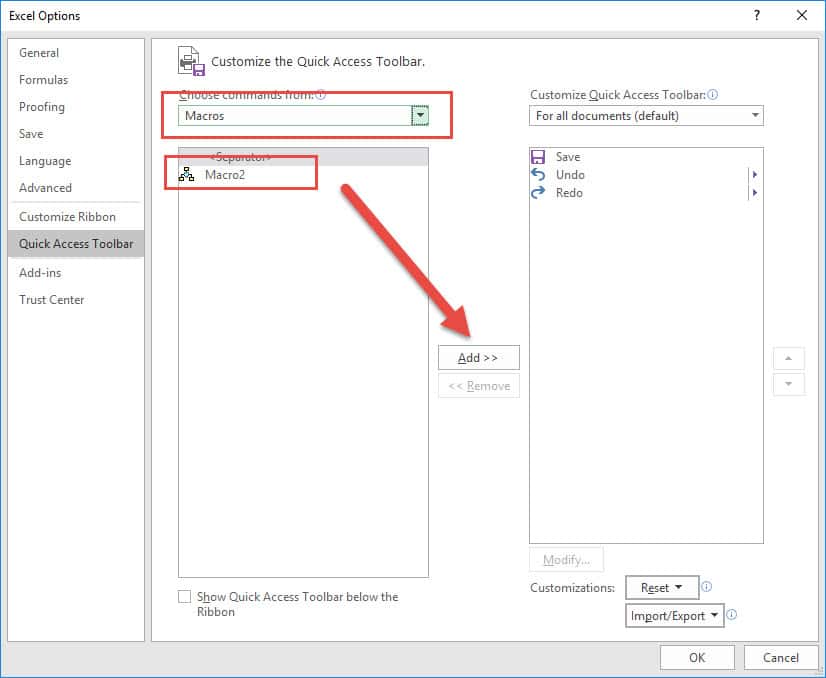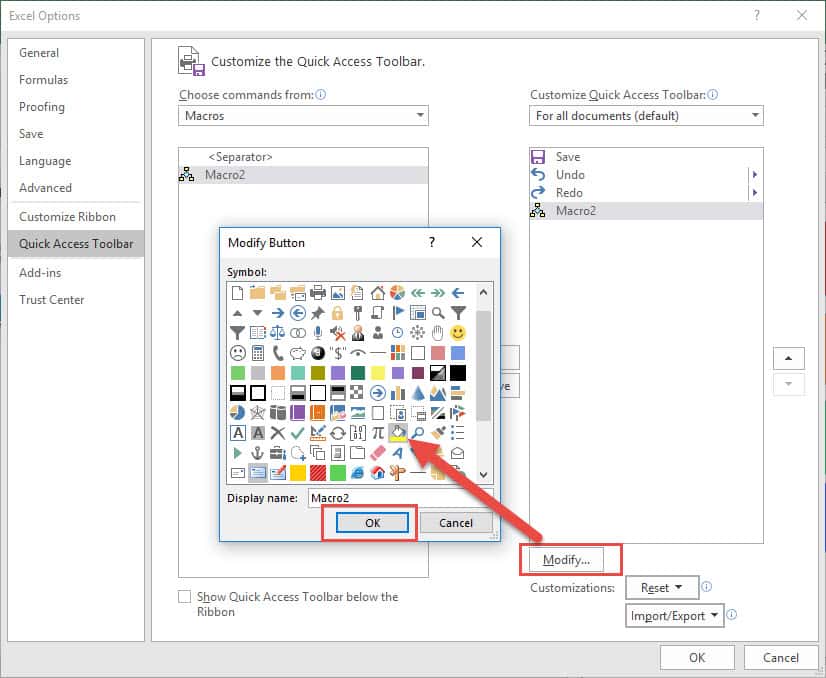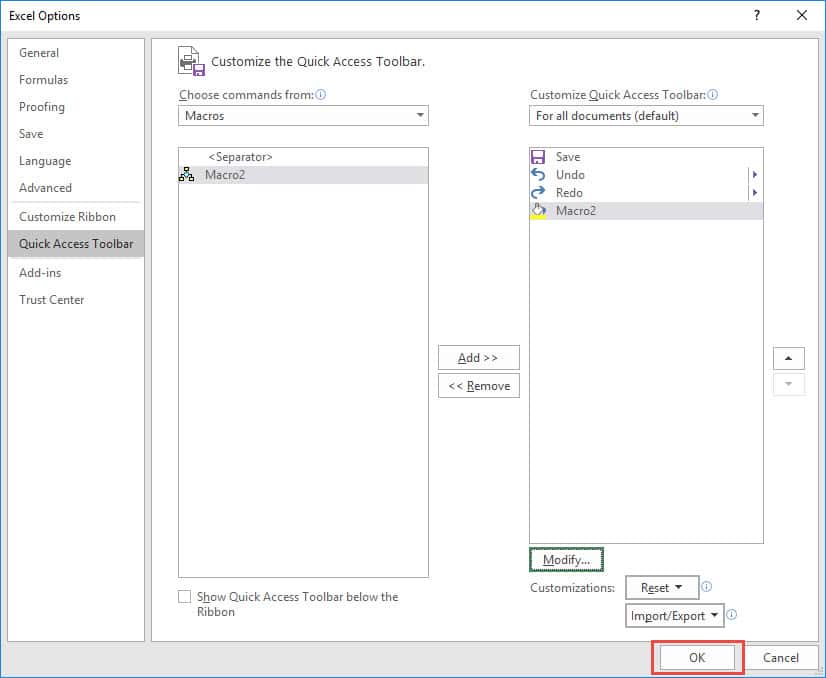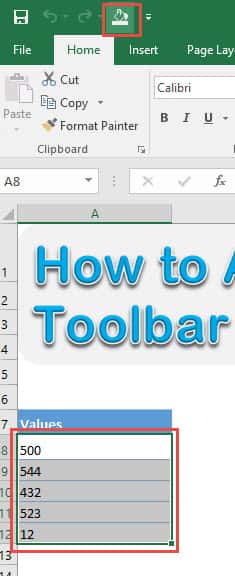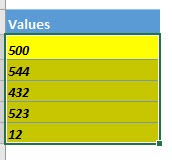You have been following our Macro tutorials and are becoming an expert in no time! Macros are a powerful way to automate repetitive tasks in Excel, allowing you to save time and reduce errors. Whether it’s formatting cells, generating reports, or manipulating data, macros can do the heavy lifting for you.
But what if there’s a macro that you’re using all of the time, day in and day out? Wouldn’t it be great if you could access it with just one click, rather than navigating through menus every time? Well, you can! In Excel, you can add a macro to the Quick Access Toolbar (QAT) or the ribbon, giving you instant access whenever you need it.
In this tutorial, I’ll show you step by step how to add a macro to the Quick Access Toolbar Ribbon in Excel.
Key Takeaways:
- Macros automate repetitive tasks in Excel, saving you time and effort.
- The Quick Access Toolbar (QAT) allows one-click access to frequently used macros.
- You can customize QAT buttons with symbols or icons for easy identification.
- Adding macros to the QAT improves workflow efficiency and productivity.
- Macro-enabled workbooks (.xlsm) are required to preserve macros and QAT settings.

Download excel workbookHow-to-Add-a-Macro-to-the-Toolbar-in-Excel.xlsm
Table of Contents
Introduction to Macros and QAT
What Are Macros in Excel?
A macro in Excel is a series of recorded actions or a piece of code that automates repetitive tasks. Instead of doing the same steps over and over manually—like formatting cells, entering formulas, or copying data—you can create a macro to perform all of those steps in one go.
- How it works: Macros are usually written in VBA (Visual Basic for Applications), which is Excel’s programming language. You can either record your actions (Excel will generate the VBA code for you) or write the code yourself.
- Example: Suppose you often need to highlight cells in yellow, make them bold, and italicize the text. Instead of doing this manually every time, you can create a macro that does it all automatically.
- Benefit: Macros save time, reduce errors, and make your workflow more efficient, especially for repetitive or complex tasks.
What Is the Quick Access Toolbar (QAT)?
The Quick Access Toolbar (QAT) is a small, customizable toolbar located above the Ribbon in Excel. It provides one-click access to your most-used commands and macros, so you don’t have to dig through menus every time you want to perform a task.
- Default commands: By default, the QAT may include commands like Save, Undo, and Redo.
- Custom commands: You can add your own macros, commands, or even toggle buttons to the QAT for tasks you use frequently.
- Benefit: Having important commands and macros on the QAT dramatically speeds up your workflow because everything is accessible with a single click.
How to Add a Macro to the Quick Access Toolbar Ribbon
STEP 1: Right click on the top Ribbon and select Customize Quick Access Toolbar.
STEP 2: On Choose commands from, select Macros from the drop down.
Select Macro2 and click Add >>
On the right side, make sure Macro2 is selected and click on Modify.
Select any Symbol that you like to represent this macro and click OK.
Click OK to finish the setup.
STEP 3: Now let us try out the macro in action!
Select a range of cells, and try out your new Quick Access Toolbar button!
That was easy! Now you can access your macro with just one click!
Troubleshooting Common Issues
Even though adding macros to the Quick Access Toolbar is simple, you might encounter some hiccups. Here’s how to solve them:
- Macro Not Appearing: Ensure the macro is in the current workbook and that it is not private. Private macros won’t show up in the QAT.
- Macro Doesn’t Run: Check your macro security settings under File > Options > Trust Center. Enable macros if they are blocked.
- Toolbar Button Missing After Reopening: If you reopen Excel and the QAT customization is gone, check if you saved the workbook as .xlsm (macro-enabled workbook). Macros in standard .xlsx files won’t persist.
- Wrong Macro Runs: Double-check the macro name you added to the QAT. Sometimes multiple macros may have similar names.
- Excel Crashes or Freezes: This is rare but can happen with complex macros. Test your macro in a smaller dataset first to ensure stability.
FAQs
Q1: Do I need programming knowledge to use macros in Excel?
No, you don’t need to be a programmer to use basic macros. Excel allows you to record macros while performing actions, and it automatically generates the VBA code. For simple tasks like formatting cells or applying styles, recording is enough. However, writing or editing VBA code can help you create more complex, customized macros. Beginners can start with recorded macros and gradually learn VBA for advanced automation.
Q2: Can I add multiple macros to the Quick Access Toolbar?
Yes, you can add as many macros as you like to the QAT. Each macro can have its own icon for easy recognition. You can also reorder them based on your workflow preferences. Keep in mind that a cluttered toolbar may reduce efficiency, so only add your most frequently used macros.
Q3: Will my macros work if I share the workbook with others?
Macros are stored in macro-enabled workbooks (.xlsm), so sharing the workbook is possible. However, the recipient must enable macros in their Excel settings for them to run. If the workbook is saved as a standard .xlsx file, macros will be removed. For team use, it’s best to provide instructions on enabling macros.
Q4: What happens if my macro does not appear on the QAT?
If a macro does not appear, it might be private or located in a different workbook. Only public macros in the current workbook are listed for QAT customization. Check that your macro is accessible and visible in the Developer Tab. If needed, save your workbook as .xlsm to ensure it persists.
Q5: Can I remove or modify a macro from the Quick Access Toolbar later?
Yes, QAT customization is flexible. You can right-click the toolbar, choose “Customize Quick Access Toolbar,” and either remove or modify your macros. You can also change the icon or display name anytime. This makes it easy to keep your workflow organized as your needs change.

Bryan
Bryan Hong is an IT Software Developer for more than 10 years and has the following certifications: Microsoft Certified Professional Developer (MCPD): Web Developer, Microsoft Certified Technology Specialist (MCTS): Windows Applications, Microsoft Certified Systems Engineer (MCSE) and Microsoft Certified Systems Administrator (MCSA).
He is also an Amazon #1 bestselling author of 4 Microsoft Excel books and a teacher of Microsoft Excel & Office at the MyExecelOnline Academy Online Course.

